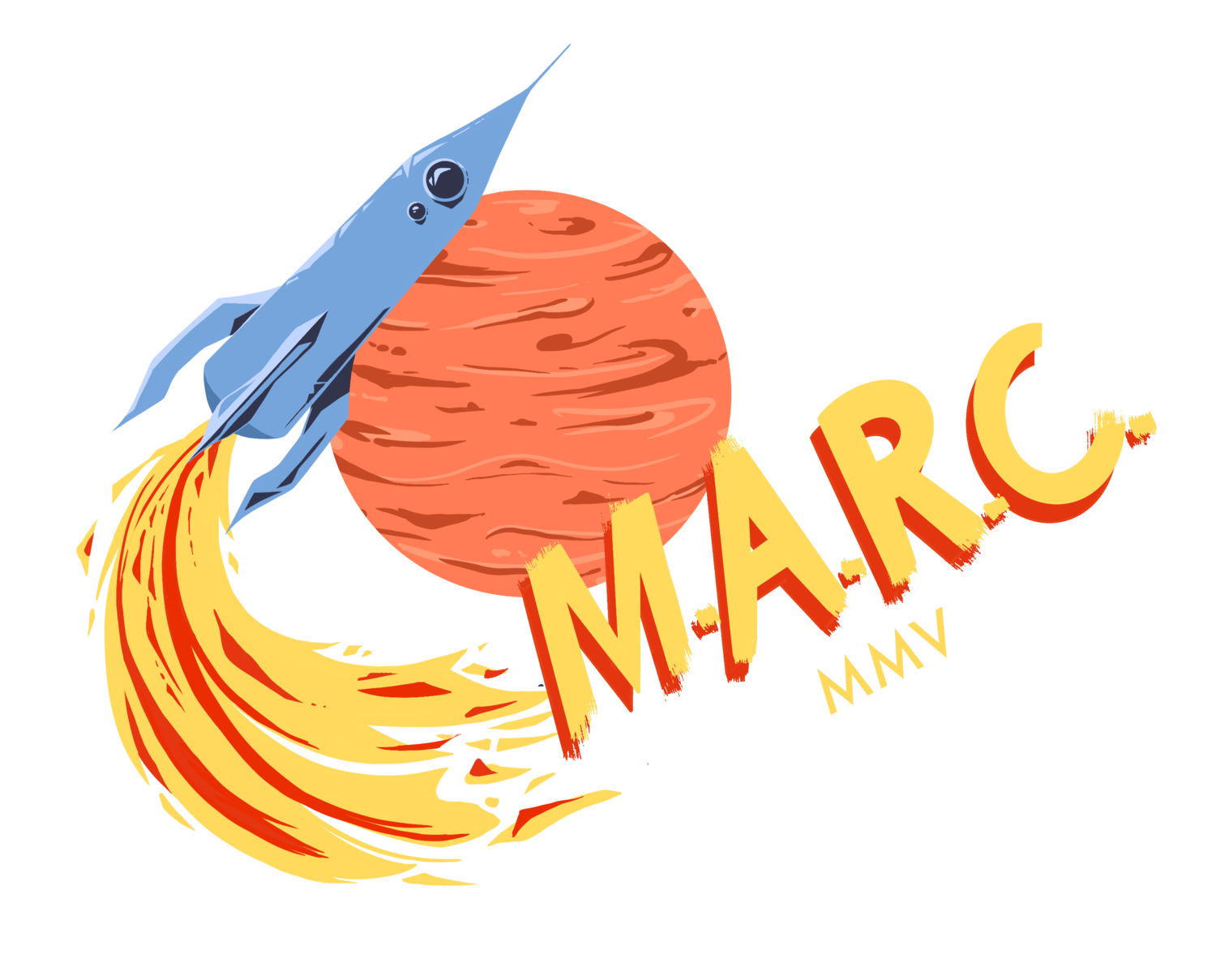Rocketry at Harvey Mudd
Harvey Mudd College has generated many aerospace engineers, pilots, astronauts, and other pioneers into the final frontier. To encourage interest in spaceflight and train the next generation of spaceflight pioneers, the Mudd Amateur Rocketry Club (MARC) was founded in 2005. This is our story.
Founding Years (2005-2009)
MARC was founded as the Mudd Amateur Rocketry Club by Brian Kirkpatrick (HMC ‘07) in Fall of 2005 during Professor Greg Lyzenga’s project to obtain Level 3 Certification in High Power Rocketry. Getting an L3 Cert was a massive deal, as it meant that there was a professor on campus who was able to purchase large motors and act as sponsor for the team. In the early days the club was small, mostly helping to organize trips to High Power Rocketry launches and nerd out about the exciting rise of private space companies like SpaceX and Scaled Composites.
From left to right: Brian Kirkpatrick (‘07), Alex Lynch (‘08), Graham Orr (‘09), and Jason Choi (‘08) at the ROC May 2007 launch.
Brian and his successor Graham Orr (HMC ‘09) worked with Engineering professors Erik Spjut and Mary Cardenas to develop Mudd’s Experimental Engineering course (E80: The Next Generation) around building high powered rockets. The course was taken by all engineering students at Harvey Mudd between 2008 and 2016, which meant that there were always a handful of students who wanted to go launch some rockets.
Graham’s other big contribution to MARC was the establishment of the Rocket Development Lab with Prof. Spjut, which offers rocketry students a place to test out their design, learn more advanced construction techniques, and work on their designs. The RDL would go on to build the Mudd I through Mudd VI rockets between 2006 and 2012.
USLI Generation (2009-2013)
Josh Edelman (HMC ‘14, left) and Chris Cotner (HMC ‘13, right) holding the USLI Rocket, Jan. 2012
After the founding cohort of MARC students had graduated, the focus of rocketry at Mudd shifted to competing in NASA’s University Student Launch Initiative (USLI). MARC students qualified to fly in the USLI 2012 launch out of Toney, Alabama on 21 April 2012. Led by Jane Hoffswell (HMC ’14) and Chris Cotner (HMC ‘13), the six person team designed, build, tested, and flew the rocket, which reached an apogee of 5051 feet, but failed to deploy parachutes properly. Despite this, data were still taken from the flight and resulted in extremely detailed documentation, providing invaluable experience for future years and proving that MARC could go toe to toe with much larger teams.
USLI’s rocket, launched on a J540 motor in April 2012
EHPS & ELET (2013-2017)
After USLI launched their rocket, MARC entered a period of limbo. The club was still largely a hobbyist group, mostly acting as a venue for students to independently conduct their own rocket builds and launches. While HPR launches would continue intermittently over this time, the major highlights came from rocket engine projects pursued during these years.
In Fall 2013, Andrew Donelick (HMC ‘15) would form the Experimental Hybrid Propulsion System (EHPS) which would go on to successfully static fire a hybrid rocket engine in the gravel pit east of the Claremont Colleges. EHPS would conduct several static fires, concluding in Spring 2015, after a two year development and test program.
EHPS engine static fire, 06 March 2015
As a successor to EHPS, the Experimental Liquid Engine Team (ELET) was started by Mike Chaffee (HMC ‘17) in Spring 2016. ELET designed and built a Gasoline/Gaseous Oxygen rocket engine that was successfully static fired at the FAR test site on 6 May 2017.
ELET engine static fire, 06 May 2017
These two propulsion projects operated largely independently of MARC’s HPR activities, which were losing momentum. When rocket E80 was discontinued in Spring 2016, interest in HPR evaporated, leading to MARC going inactive for a period between 2015 and 2017.
MARCY & JTS (2017-2020)
In Spring of 2018, Isabel King (HMC ‘18) resurrected MARC, this time changing the name to the ‘Mudd Amateur Rocketry Club, Yeah!’, or MARCY for short. One of Isabel’s main goals was revitalize interest in the club, and additionally make rocketry more accessible to people of all backgrounds. Isabel would host orbital launch watch parties and successfully got MARC off the ground once again.
After her graduation, Roger Hooper (HMC ‘19) changed the name back to MARC, and organized a SpaceX tour and an HPR launch in December 2018. Additionally, Roger split off a part of MARC to start the Journey to Space (JTS) initiative. JTS attempted to build a booster-dart rocket modelled after the Super-Loki rocket that would breach the Von Kármán Line, which would have made Mudd the second university to accomplish a spaceshot, following USC. JTS made significant early progress, with a flight vehicle fully designed and many components purchased for manufacturing. Difficulties arose, however, when the College refused to allow the initial sorbitol solid propellant to be made and cast on campus. A propellant switch was made to the more conventional Ammonium Perchlorate propellant, but this too was struck down by safety officers at the college.
After Roger’s graduation, Mariah Ewing (HMC ‘20) took over MARC and JTS, but had similar difficulties in moving the spaceshot project forward. JTS had just decided to move forward with a test launch on a commercially purchased Level 3 motor when the COVID-19 pandemic put all plans on ice in March 2020. Ultimately, JTS would lose its main proponents upon their graduation in May 2020, leaving Erik Meike (HMC ‘21) as the sole manager of JTS going into the 2020-21 academic year.
MARC (2020-2021)
MARC’s current logo, designed by Avalon Vinella (HMC ‘22)
In the fall of 2021, Edward Jacobs (HMC ‘22) became MARC President and began implementing a policy of organizing monthly HPR launches and standardizing the process of obtaining L1 certification using the LOC Vulcanite rocket kit. MARC earned it’s highest number of L1 and L2 certifications in the 2021-2022 school year!
MARC at ROCSTOCK 2021
MARC (Present)
MARC Leadership for the ‘22-’23 school year has been working hard to change the structure of MARC from any previous years to promote student learning, success, and productivity. In doing so, they decided to create 3 well established sub-teams of MARC that will help students gain technical experience in both rocketry and industry, while also preserving institutional knowledge. MARC now operates with the following three teams. More information can be seen on their respective pages!
2022/23 MARC Leadership Team:
Arpita Bhutani, HMC ‘23, Liquid Rocket Engine Dev. Chief Engineer
Nick Zemtzov, HMC ‘23, Competition Team Chief Engineer
Ethan Vasquez, HMC ‘25, Director of High Power Rocketry









